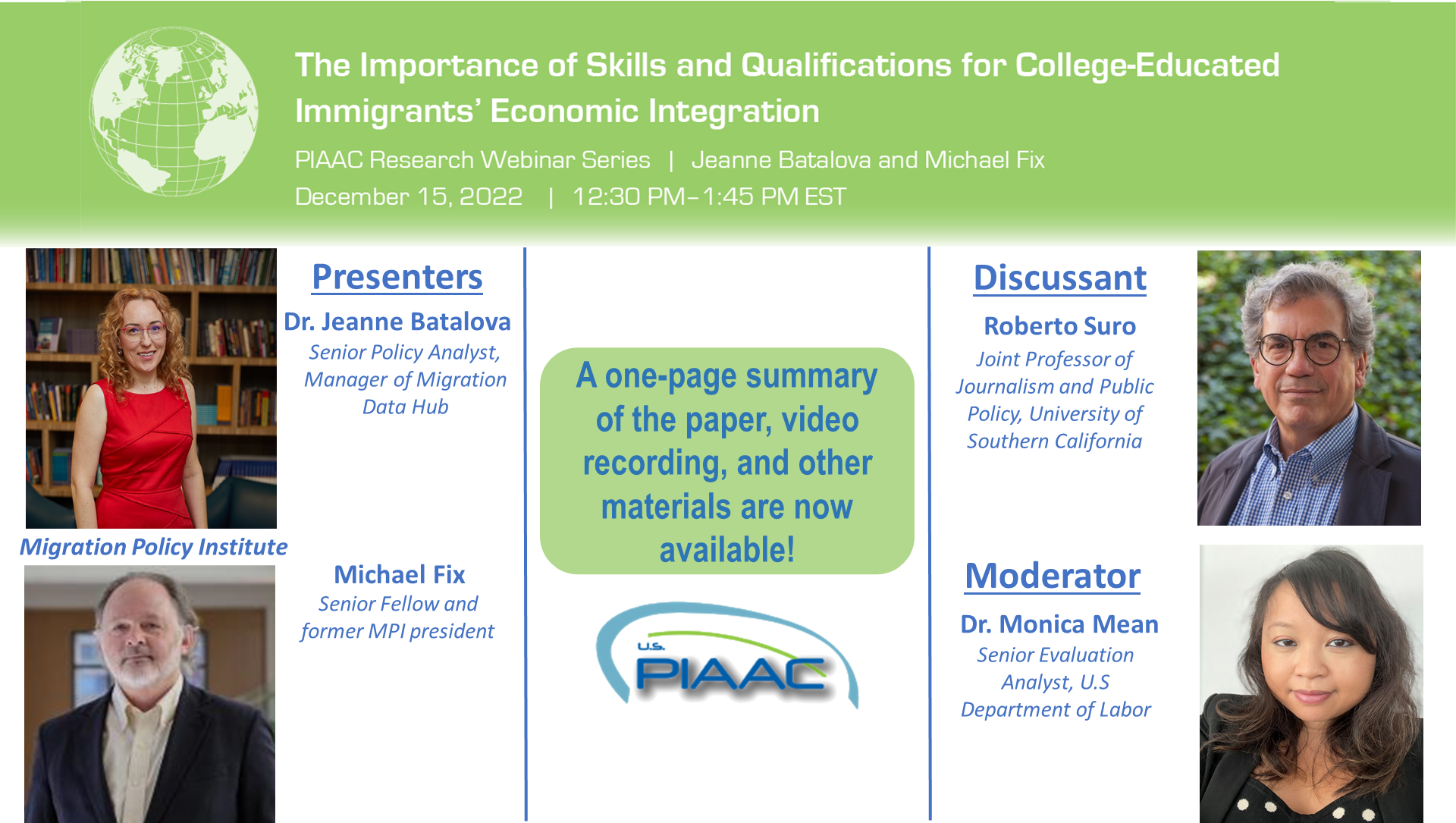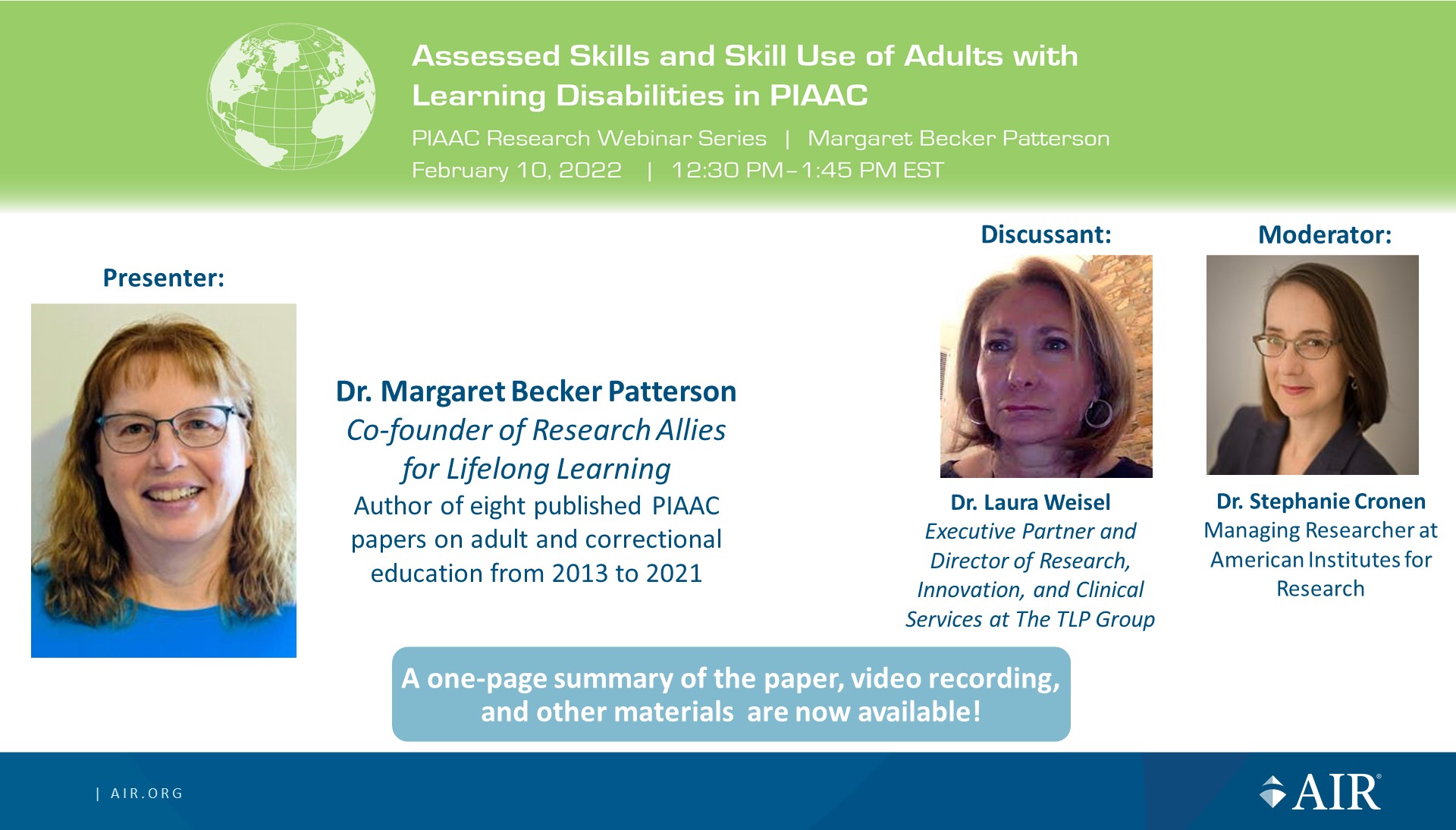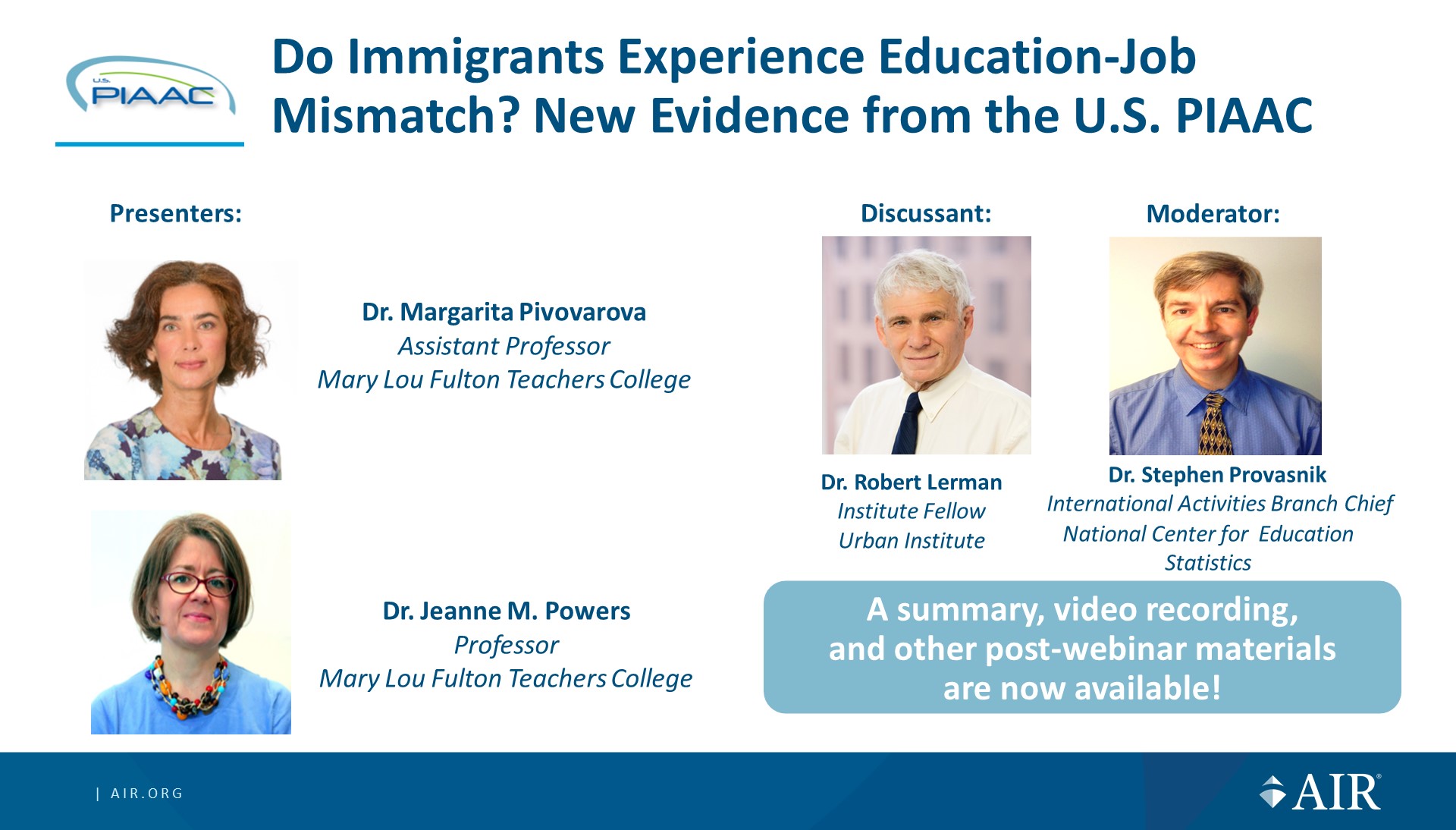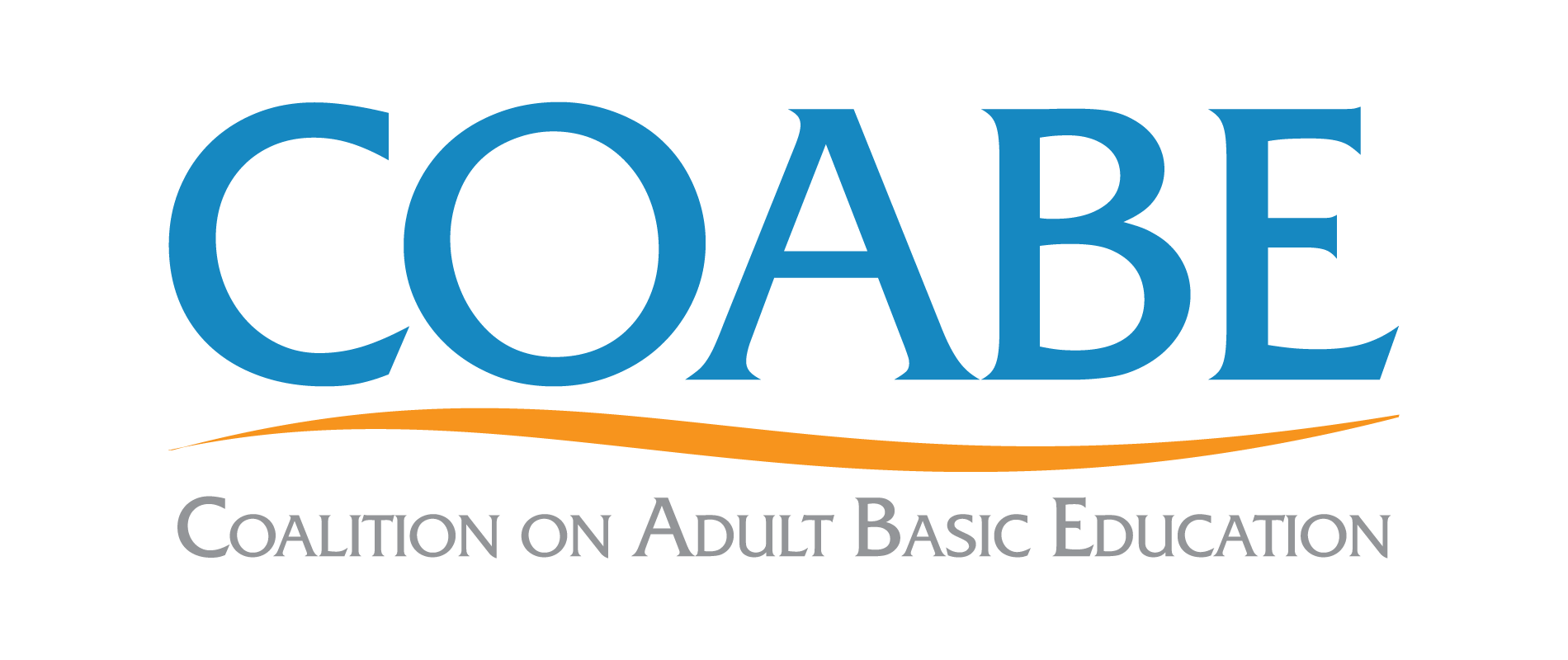The PIAAC Research Webinar Series are virtual presentations of AIR commissioned papers by the authors who used PIAAC data to explore topics associated with adult competencies in literacy, numeracy, and digital problem-solving. Most recent webinar is on the top. Scroll down to view other webinars.
| Date | Title | Webinar Information |
|---|---|---|
| 4/20/23 | 
|
Conference Agenda |
| Date | Title | Webinar Information |
| 12/15/22 | 
|
Conference Agenda |
| Date | Title | Webinar Information |
| 2/10/22 | 
|
Conference Agenda |
| Date | Title | Webinar Information | 9/14/21 | 
|
Conference Agenda |
A First Look: Examining Information Processing Skill Proficiencies Among Black Adults in the U.S. Using the PIAAC Data- April 20, 2023
Panelists:
Presenters: Dr. Leah Katherine Saal, Loyola University Maryland; Dr. Takashi Yamashita and Dr. Ramon B. Goings, University of Maryland, Baltimore County
Moderator: Dr. Stephen Provasnik, National Center for Education Statistics
On April 20, the AIR-PIAAC team hosted a highly engaging research webinar with over 40 attendees. The webinar included a presentation by Dr. Leah Katherine Saal, Associate Professor of Literacy at Loyola University Maryland, Dr. Takashi Yamashita, Professor of Sociology & Gerontology at University of Maryland, Baltimore County, and Dr. Ramon B. Goings, Associate Professor of Language, Literacy, and Culture at the University of Maryland, Baltimore County. Dr. Stephen Provasnik, Deputy Commissioner of the Office of the Commissioner at the National Center for Education Statistics, moderated the session. The presentation focused on findings from the recently published PIAAC research paper called, “Examining Information Processing Skill Proficiencies Among Black Adults in the U.S.” The paper, commissioned by AIR with funding from NCES, was published in February 2023. In the paper, the authors examine what within-group differences can be observed in the Black or African American population in the United States using PIAAC data. A host of demographic and socioeconomic characteristics, nuancing the skills profile of Black adults, have been historically underreported on. Dr. Saal, Dr. Yamashita, and Dr. Goings buck the trend of oversimplification for this population by looking closely at subgroup populations to understand how education, employment, health, social trust, civic engagement, and more relate to information processing skill levels within the Black adult U.S. population. They also discussed how these differences can inform policymakers and practitioners in the 21st century.
The Importance of Skills and Qualifications for College-Educated Immigrants’ Economic Integration - December 15, 2022
Panelists:
Presenters: Dr. Jeanne Batalova and Michael Fix, Migration Policy Institute (MPI)
Discussant: Dr. Roberto Suro, University of Southern California
Moderator: Dr. Monica Mean, U.S. Department of Labor
On December 15, the AIR-PIAAC team hosted a highly engaging research webinar with over 80 attendees. The webinar included a presentation by Dr. Jeanne Batalova (Senior Policy Analyst and Manager of the MPI Migration Hub, Migration Policy Institute) and Mr. Michael Fix (Senior Fellow,Migration Policy Institute) and a discussion led by Professor Roberto Suro (Professor, University of Southern California). Dr. Monica Mean (Senior Evaluation Specialist, Department of Labor) moderated the session. The presentation focused on findings from a recently published PIAAC research paper called, “The Importance of Skills and Qualifications for College-Educated Immigrants’ Economic Integration” The paper, commissioned by AIR with funding from NCES, was published in August 2022. In the paper, the authors explore relationships between cognitive skills, employment, and numerous other factors pertaining to the varied economic integration of college-educated U.S. immigrants. A notable finding discussed in the presentation is that one fifth of college graduates are underutilized. The term skill underutilization was defined in the presentation and paper as the share of college-educated workers in the civilian labor force who report that they were in jobs requiring no more than a high school education or that they were unemployed. This paper highlights encouraging aspects of the state of immigrant economic integration, including their greater average monthly earnings than U.S. born, college-educated adults.
Assessed Skills and Skills Use of Adult with Learning Disabilities in PIAAC - February 10, 2022
Panelists:
Presenter: Margaret Becker Patterson, Research Allies for Lifelong Learning
Discussant: Laura Weisel, The TLP Group: PowerPath to Education & Employment – Align & Redesign
Moderator: Stephanie Cronen, American Institutes for Research
On February 10, 2022, the second installment of the PIAAC Research Webinar Series, Assessed Skills and Skill Use of Adults with Learning Disabilities in PIAAC, took place virtually over Zoom with over 115 attendees. The event centered around a presentation and discussion on findings from a recent Program for the International Assessment of Adult Competencies (PIAAC) research paper authored by Margaret Becker Patterson. Using the combined 2012/14/17 U.S. PIAAC data of over 12,000 participants, Margaret explored the relationships between several demographic characteristics, skill levels, and skill use of U.S. adults with LD in different settings and employment status.
Approximately 9.4% of adults reported having LD in PIAAC. While adults with LD may have a desire to learn and strengthen their skills, the rates of uncompleted education are high among this demographic. Findings suggest that using numeracy skills and digital literacy skills matter in gaining – or keeping – the skills themselves. Knowing relationships of assessed skills with skill use for this population may help in identifying strategies educators can implement to support adult program completion. In addition, the author states that having this knowledge can be beneficial to employers, and policy makers as it can identify strategies to best assist adults with LD.
Read the full research paper here
Conference Agenda
Webinar Recording
Bios of Presenters
PowerPoint Slide Deck
Evaluation Form
One-Page Summary of Paper
Webinar Questions and Answers
PIAAC Team
Do Immigrants Experience Education-Job Mismatch? New Evidence from the U.S. PIAAC - September 14th, 2021
Panelists:
Presenters: Margarita Pivovarova and Jeanne M. Powers, Mary Lou Fulton Teachers College at Arizona State University
Discussant: Robert Lerman, Institute Fellow, Urban Institute
Moderator: Stephen Provasnik, International Activities Branch Chief, National Center for Education Statistics
On September 14, the AIR-PIAAC team hosted a highly engaging research webinar for over 80 attendees. The webinar included a presentation by Dr. Margarita Pivovarova (Assistant Professor at Mary Lou Fulton Teachers College) and Dr. Jeanne Powers (Professor at Mary Lou Fulton Teachers College), and a discussion by Dr. Robert Lerman (Institute Fellow from Urban Institute). Dr. Stephen Provasnik (International Activities Branch Chief for NCES) moderated the session. The presentation focused on findings from a PIAAC research paper called “Do Immigrants Experience Education-Job Mismatch? New Evidence from the U.S. PIAAC”. The paper, commissioned by AIR with funding through a contract with NCES, was published in May 2021. In the paper, researchers document the patterns of, and the factors associated with, education-job mismatch and analyze how the incidence of mismatch differs by demographic characteristics among U.S.-born and foreign-born workers. The findings indicate that overeducation is more prevalent among foreign-born workers and second-generation workers (i.e., those whose parents are foreign-born). The authors also find that a good command of English mitigates the chances of overeducation for immigrant workers while the length of stay in the United States does not.
After the presentation and discussion of the findings by Dr. Lerman, Dr. Provasnik moderated the Q&A session that was one of the most active ones he said he has ever experienced – there were over 20 questions submitted in the chat for this twenty-minute presentation! The Q&A session was followed by lively small-group discussions.
About the PIAAC Research Webinar Series
The PIAAC Research Webinar Series provides engaging and thought-provoking virtual presentations featuring AIR commissioned paper authors who used PIAAC data to explore topics associated with adult competencies in literacy, numeracy, and digital problem-solving.
AIR PIAAC commissioned papers are funded through a contract with the National Center for Education Statistics (NCES) of the U.S. Department of Education.









